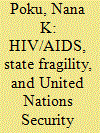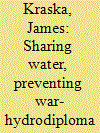|
|
|
Sort Order |
|
|
|
Items / Page
|
|
|
|
|
|
|
| Srl | Item |
| 1 |
ID:
124515


|
|
|
|
|
| Publication |
2013.
|
| Summary/Abstract |
When, in 2000, the United Nations Security Council (UNSC) discussed a global response to the growing HIV/AIDS pandemic, it was the first time in the institution's history that its members had debated a non-mandated issue. The preserve of this institution had, until then, been focused on preventing wars and the proliferation of weapons of mass destruction. Yet the mounting evidence on the societal impacts of HIV/AIDS was no less devastating for affected communities. In most heavily affected societies, the prevalence of HIV/AIDS doubled in less than ten years. But was the case that led to UNSC Resolution 1308 overstated? This article revisits the case that led to the Security Council meeting and argues that, far from being overstated, Resolution 1308 helped to avert a crisis of unimaginable proportions.
|
|
|
|
|
|
|
|
|
|
|
|
|
|
|
|
| 2 |
ID:
092076


|
|
|
|
|
| Publication |
2009.
|
| Summary/Abstract |
Over the past decade, scholars have closely examined the linkage between environmental change, security, and conflict. Severe deforestation, soil erosion, soil salinisation and water-logging, toxic contamination, drought and flooding, and air and water pollution are some of the environmental calamities that can increase international tension and even lead to conflict. What is perhaps more interesting, however, is that reversing the equation is also true. Environmental conservation and cooperative governance between neighbouring states can contribute to regional stability and conflict avoidance. This article suggests the international trans-boundary river agreement between India and Pakistan to manage the Indus River reduces tension and prevents war between the nuclear-armed rivals. During the Kargil crisis in 2001, for example, the trans-boundary river management regime was the most functional bilateral relationship between the two South Asian powers.
|
|
|
|
|
|
|
|
|
|
|
|
|
|
|
|
|
|
|
|
|